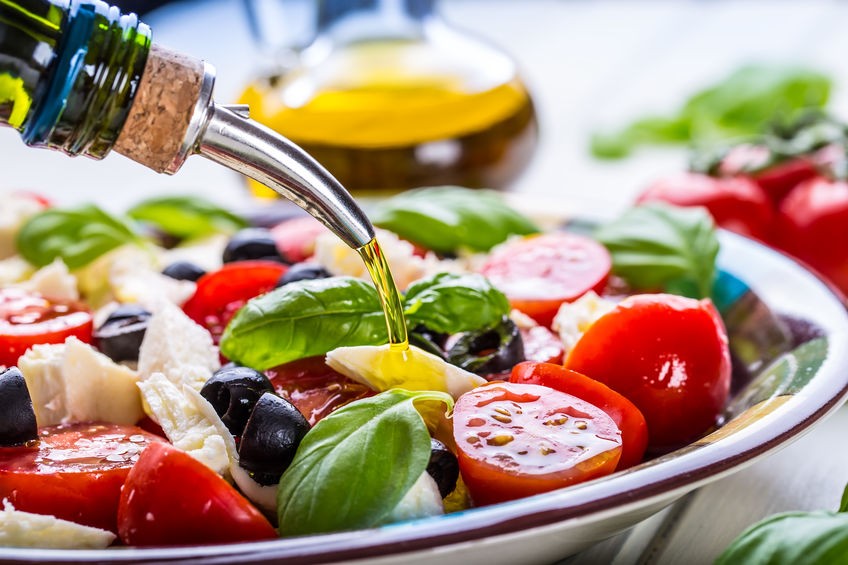The food market is ever evolving, but one area that has seen exponential growth recently is fats and oils. Which oils should you be cooking with? Is coconut oil really good for you? Should we stop eating butter? Keep reading to find out.
If there are any more cooking oils you would like information on, please contact us to let us know. To read about the basic nutrition of fats and oils, read this article.
Why is your choice of cooking oils important?
There are four reasons why it is important to select the correct oil for the method of cooking you will be using. Firstly, the smoke point of the oil, secondly the production of free radicals, thirdly the nutritional value and finally flavour!
- The smoke point is the amount of heat an oil can withstand before it begins to break down and burn. When an oil reaches its smoke point it will produce not only smoke but also burnt bitter flavours.
- Another effect of the oil breaking down is the production of free radicals. When oils are heated if they become unstable and can oxidise or turn rancid. When oils become oxidised, they form free radicals, as explained in the antioxidant article here. Free radicals are harmful compounds.
- Although there are lots of positive health benefits to consuming plant oils, the longer the oil is cooked for the more these benefits will be lost. For example, the polyphenols in olive oil (shown in some research to be responsible for its health benefits) are destroyed by heat.
- Arguably one of the most important reasons for selecting the right oil is ensuring it is one that will enhance and complement the flavour of your food.

Useful information on different oils and fats
Olive oil
Smoke point (virgin olive oil) 391°F / 199°C
- Olive oil is mainly a monounsaturated fat called oleic acid (73% of the total content).
- Olive oil has been shown in research to lower your risk of heart disease as it reduces inflammation, helps protect cholesterol from oxidation and may help prevent blood clots. In a study of 140,000 participants those who consumed olive oil were at a lower risk of stroke than those who did not.
- Olive oil is full of antioxidants, which help lower inflammation. Chronic inflammation is thought to be a leading driver of diseases, such as cancer, heart disease, metabolic syndrome, type 2 diabetes, Alzheimer’s, arthritis and even obesity.
- Olive oil has been shown to reduce blood sugar and improve insulin sensitivity.
- Extra virgin olive oil has been less processed than refined olive oil, therefore has retained more compounds associated with positive health benefits. So, when shopping read the labels carefully.
Olive oil and avocado oil have very similar nutritional profiles and health effects. Avocado oil has a higher smoke point so is better used for cooking at high temperatures.
Avocado oil
Smoke point 570°F / 271°C
- The most prominent fat in avocado oil is oleic acid, a monounsaturated omega-9 fatty acid. This is also the most prominent fat in olive oil. Oleic acid has been associated with improving cellular health, heart health, brain function, benefiting those with type 2 diabetes and help with weight management.
- What’s more, avocado oil and olive oil were found to be the most effective in increasing good HDL cholesterol and reducing bad LDL cholesterol.
- Lutein is a carotenoid found in avocado oil. This nutrient improves eye health and may lower the risk of age-related eye diseases.
Palm oil
Smoke point 475°F / 232°C
- It is a vegetable oil with a very high saturated fat content (50%) which can lead to an increased risk of cardiovascular disease.
- It contains no cholesterol and is a rich source of carotenoids and vitamin E which confers natural stability against oxidative deterioration (see antioxidant article).
- There are some important negative environmental effects of producing non sustainable palm oil. For example, deforestation, loss of habitat, soil erosion, water pollution and carbon emissions. So, it is important to buy sustainable palm oil, or even better, avoid it all together!
Peanut oil (ground nut oil)
Smoke point 450°F / 232°C
- Peanut oil contains 20% saturated fat, 50% monounsaturated fat and 30% polyunsaturated fat.
- It’s also rich in omega 6 fatty acid and vitamin E, which may help reduce the risk of heart disease and improve insulin sensitivity in diabetics.
- On the other hand, as mentioned earlier consuming too much omega 6 is not good for you and can lead to inflammation. Poly unsaturated fats are also more likely to become oxidised increasing the risk of some diseases.
Coconut oil, butter and ghee all have a high saturated fat content. This means that they are good choices when cooking at a high heat.
Coconut oil
Smoke point 450°F / 232°C
- Coconut oil is more than 80% saturated fat. Compared to a tablespoon of olive oil, a tablespoon of coconut oil contains about six times the amount of saturated fat.
- There are two arguments, one being that coconut oil is good for you and the other that it is bad for you.
- Some of the positive health benefits are that it is high in vitamin E and polyphenols. Vitamin E is a powerful antioxidant, see our article on antioxidants for their positive health benefits.
- Experts also say that coconut oil’s lauric acid, a healthier type of saturated fat, is used as energy in the body rather than stored. This in turn has led to coconut oil being used as a weight loss tool.
- On the other hand, in many studies coconut oil has been shown to produce negative health benefits such as raising cholesterol, therefore increasing the risk of heart disease.
Some marketing schemes are not claiming that virgin coconut oil is better for you.
- There have been claims that the negative health benefits from coconut oil are due to the hydrogenation and claim that as virgin oil is not hydrogenated therefore it is better for you.
- However as only a small percentage of coconut oil (8%) is unsaturated only 8% is actually hydrogenated, so the nutritional impacts are similar.
Butter
Smoke point 200-250°F / 120-150°C
- Butter has less saturated fat than coconut oil. Around 63% of the fat in butter is saturated fat.
- One of the most common negative health benefits discussed is that eating too much butter will cause weight gain. As butter is high in calories (around 102 calories per tablespoon) if consumed in excess this could easily lead to weight gain.
- As discussed earlier in the article saturated fat can lead to an increased risk of heart disease and increase bad cholesterol.
- On the other hand, butter is a source of vitamin A (beneficial for skin, immune function and eyesight) and vitamin E, a powerful antioxidant (see our article on antioxidants to understand their health benefits).
- Recent research has also shown that consuming butter in moderation can lead to positive health benefits. However, it is important to note that these health benefits have been reported in studies using a much more concentrated dose of the positive compound than those found in shop bought butter.
- For example, a short chain fatty acid called butyrate is prevalent in butter. Butyrate has been associated with some positive health benefits such as promoting digestive health and reducing inflammation in the intestines. It has also been used in treating IBS and Chrones disease as it is produced by bacteria in the gut.
- Butter is one of the best food sources of conjugated linoleic acid. This is a type of fat found in both meat and dairy products. Some of the health benefits linked with CLA are anticancer properties, lower body fat, support immune function and reduce inflammation.
Overall, although there are some positive health benefits to consuming butter the conclusion should still be to eat butter in moderation and as part of a healthy balanced diet.
Ghee
Smoke point 485°F / 252°C
- Ghee is a better choice for cooking at high temperatures due to the high smoke point.
- Ghee has a very similar nutritional profile to butter. It contains slightly more saturated fat per tablespoon of ghee (ghee 8g and butter 7g).
- It contains more of the short chain fatty acid called butyrate and conjugated linoleic acid than butter does.
- Ghee is a rich source of Omega-3 fatty acids which decrease LDL cholesterol.
- The high levels of saturated fat present in ghee will increase bad cholesterol in the body. One concern is that cholesterol may become oxidised at high heat, therefore increasing the risk of heart disease.
For individuals who already have atherosclerosis- It would not be advisable to consume coconut oil, butter or ghee.
How to take care of your cooking oils
- Don’t buy large containers of oil at a time unless you know you will use it before it has the opportunity to spoil.
- The main causes of oxidative damage are heat, oxygen and light. That’s why it is best to store cooking oils in a cool, dry, dark place and keep lids screwed on tightly.
Conclusion
If you are looking to reduce your saturated fat in your diet then try swapping cooking oils and fats high in saturated fats such as butter, ghee, and coconut oil for monounsaturated or polyunsaturated fats such as plant oils. Choosing between high saturated fats is difficult based on the nutritional profile as they are similar, this decision should be based on flavour and how suitable they are for your dish.
Studies discussed in the article
Potential Health Benefits of Olive Oil and Plant Polyphenols. International journal of molecular sciences
Gorzynik-Debicka, M., Przychodzen, P., Cappello, F., Kuban-Jankowska, A., Marino Gammazza, A., Knap, N., Wozniak, M., & Gorska-Ponikowska, M.
Link- https://www.ncbi.nlm.nih.gov/pmc/articles/PMC5877547/
Health Effects of Coconut Oil-A Narrative Review of Current Evidence.
Wallace TC
Link- https://www.ncbi.nlm.nih.gov/pubmed/30395784
Supplementation with conjugated linoleic acid for 24 months is well tolerated by and reduces body fat mass in healthy, overweight humans.
Gaullier JM1, Halse J, Høye K, Kristiansen K, Fagertun H, Vik H, Gudmundsen O.
Link- https://www.ncbi.nlm.nih.gov/pubmed/15795434/


